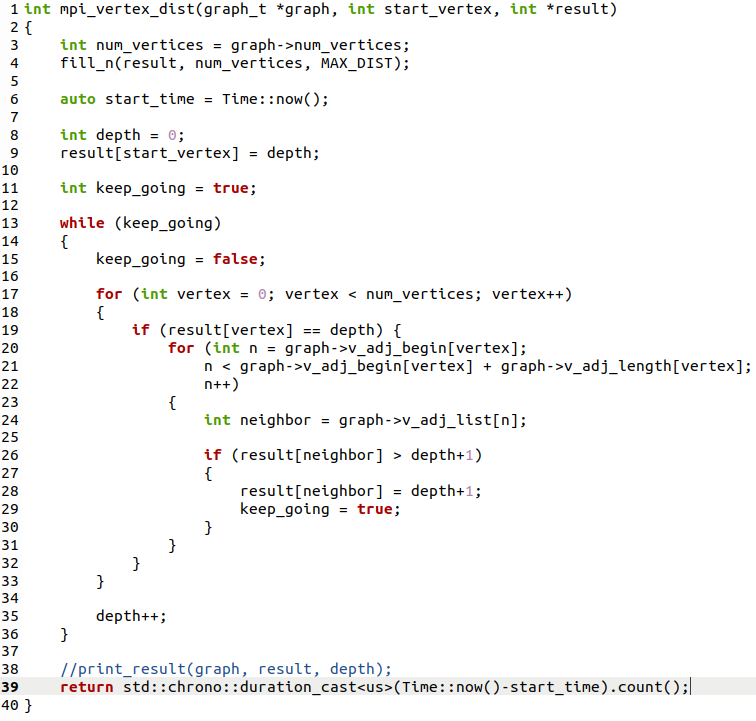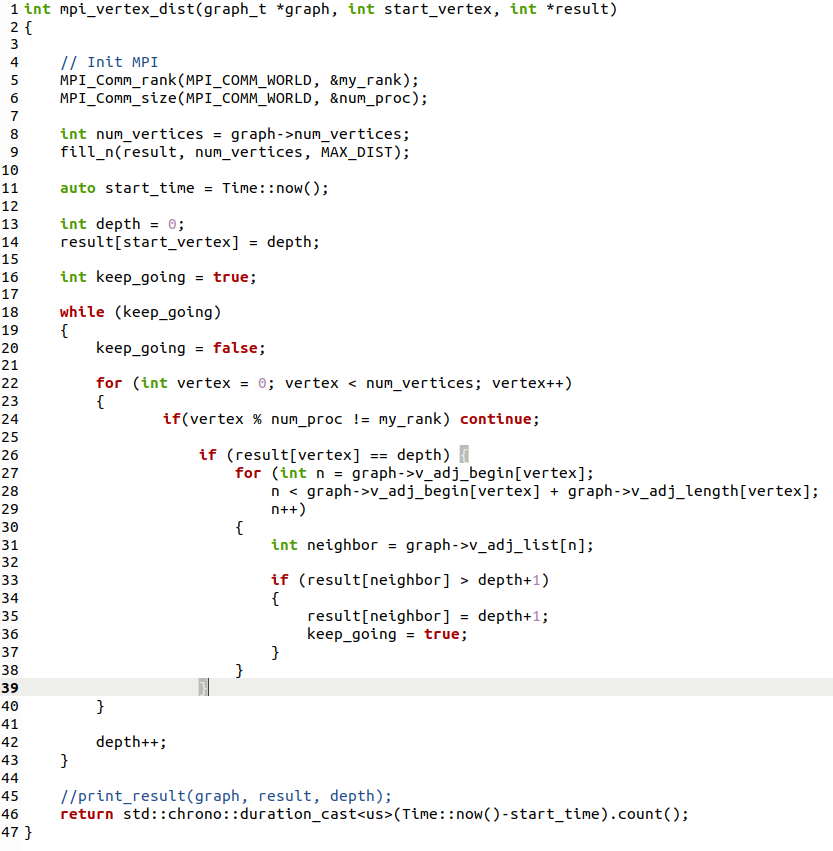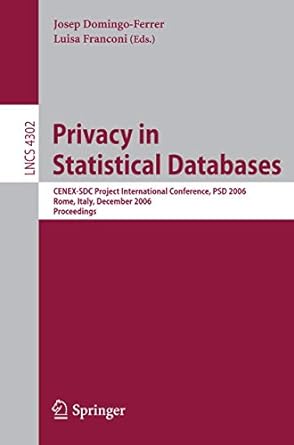Question
I want to split the data structures that represent the graph evenly across the processes using MPI. And update the result I have brought my

I want to split the data structures that represent the graph evenly across the processes using MPI. And update the result

I have brought my code up to this point. However I am having problem to update the result array for each processes to make sure that they have relevant information
This is what I am trying to solve.
In this part, you will have to split the graph vertices. This might seem trivial at first, but since every vertices neighbor might be assigned to a different process, communication is required. To implement it, you have to split the data structures that represent the graph evenly across the processes. However, you would still need a set of variables or a data structure that will be shared across the processes to make sure each of them has relevant and updated information about the already visited nodes and their corresponding depths.
NM no 4 8 1 int mpi_vertex_dist(graph_t *graph, int start vertex, int *result) 2{ 3 int num_vertices = graph ->num_vertices; fill_n(result, num_vertices, MAX_DIST); 5 6 auto start_time = Time:: now(); 7 int depth = 0; 9 result[start_vertex] = depth; 10 11 int keep going = true; 12 13 while (keep going) 14 { 15 keep going = false; 16 17 for (int vertex 0; vertex v_adj_begin[vertex]; na graph->v_adj_begin[vertex] + graph->v_adj_length[vertex]; 22 n++) 23 { 24 int neighbor = graph->v_adj_list[n]; 25 26 if (result[neighbor] > depth+1) 27 { 28 result[neighbor] = depth+1; 29 keep going = true; 30 au 21 NNN N NNN mm } 31 } } 32 33 34 } 35 depth++; mmm } 36 37 38 39 //print_result(graph, result, depth); return std::chrono:: duration_cast us>(Time:: now()-start_time).count(); 40 } NM 00 1 int mpi_vertex_dist(graph_t *graph, int start_vertex, int *result) 2{ 3 4 // Init MPI 5 MPI_Comm_rank(MPI_COMM_WORLD, &my_rank); 6 MPI_Comm_size(MPI_COMM_WORLD, &num_proc); 7 8 int num_vertices = graph->num_vertices; 9 fill_n(result, num_vertices, MAX_DIST); 10 11 auto start_time = Time:: now(); 12 13 int depth = 0; 14 result[start_vertex] depth; 15 16 int keep going = true; 17 18 while (keep going) 19 { 20 keep going = false; 21 22 for (int vertex = 0; vertex v_adj_begin[vertex]; 28 n v_adj_begin[vertex] + graph ->v_adj_length[vertex]; 29 n++) 30 { int neighbor = graph->v_adj_list[n]; 32 if (result[neighbor] > depth+1) 34 { result[neighbor ] = depth+1; 36 keep going = true; 37 } 38 } 39 40 } 41 42 depth++; 43 } 44 45 //print_result(graph, result, depth); 46 return std::chrono:: duration_cast us>(Time:: now()-start_time).count(); 47 } 27 31 OOO OUAWNO 00 OWN 33 35 NM no 4 8 1 int mpi_vertex_dist(graph_t *graph, int start vertex, int *result) 2{ 3 int num_vertices = graph ->num_vertices; fill_n(result, num_vertices, MAX_DIST); 5 6 auto start_time = Time:: now(); 7 int depth = 0; 9 result[start_vertex] = depth; 10 11 int keep going = true; 12 13 while (keep going) 14 { 15 keep going = false; 16 17 for (int vertex 0; vertex v_adj_begin[vertex]; na graph->v_adj_begin[vertex] + graph->v_adj_length[vertex]; 22 n++) 23 { 24 int neighbor = graph->v_adj_list[n]; 25 26 if (result[neighbor] > depth+1) 27 { 28 result[neighbor] = depth+1; 29 keep going = true; 30 au 21 NNN N NNN mm } 31 } } 32 33 34 } 35 depth++; mmm } 36 37 38 39 //print_result(graph, result, depth); return std::chrono:: duration_cast us>(Time:: now()-start_time).count(); 40 } NM 00 1 int mpi_vertex_dist(graph_t *graph, int start_vertex, int *result) 2{ 3 4 // Init MPI 5 MPI_Comm_rank(MPI_COMM_WORLD, &my_rank); 6 MPI_Comm_size(MPI_COMM_WORLD, &num_proc); 7 8 int num_vertices = graph->num_vertices; 9 fill_n(result, num_vertices, MAX_DIST); 10 11 auto start_time = Time:: now(); 12 13 int depth = 0; 14 result[start_vertex] depth; 15 16 int keep going = true; 17 18 while (keep going) 19 { 20 keep going = false; 21 22 for (int vertex = 0; vertex v_adj_begin[vertex]; 28 n v_adj_begin[vertex] + graph ->v_adj_length[vertex]; 29 n++) 30 { int neighbor = graph->v_adj_list[n]; 32 if (result[neighbor] > depth+1) 34 { result[neighbor ] = depth+1; 36 keep going = true; 37 } 38 } 39 40 } 41 42 depth++; 43 } 44 45 //print_result(graph, result, depth); 46 return std::chrono:: duration_cast us>(Time:: now()-start_time).count(); 47 } 27 31 OOO OUAWNO 00 OWN 33 35Step by Step Solution
There are 3 Steps involved in it
Step: 1

Get Instant Access to Expert-Tailored Solutions
See step-by-step solutions with expert insights and AI powered tools for academic success
Step: 2

Step: 3

Ace Your Homework with AI
Get the answers you need in no time with our AI-driven, step-by-step assistance
Get Started


